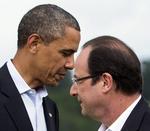France balks at the US-Iranian deal on five counts – not least with an eye on its Gulf ties
DEBKAfile Exclusive Analysis March 21, 2015
President Barack Obama failed to shift French President France Hollande from his objections to the nuclear accord taking shape between the US and Iran in the call he put through to the Elysée Friday night, March 30. US Secretary of State John Kerry fared no better Saturday, when he met British, French and German Foreign ministers in London for a briefing on the talks’ progress intended to line the Europeans up with the American position. He then found, according to debkafile’s sources, that France was not alone; Germany too balked at parts of the deal in the making.
The French are demanding changes in five main points agreed between Kerry and Iranian Foreign Minister Javad Zarif before the Iranians quit the talks Friday: They insist that –
Iran can’t be allowed to retain all the 6,500 centrifuges (for enriching uranium) conceded by the Americans. This figure must be reduced. Similarly, the stocks of enriched uranium accepted by the US to remain in Iranian hands are too large. France insists on a longer period of restrictions on Iran’s nuclear work before sanctions are eased. It is pushing for a longer moratorium – 25 years rather than the 15 years offered by the Obama administration – and guarantees at every stage.
The main sticking point however is France’s insistence that UN sanctions stay in place until Iran fully explains the evidence that has raised suspicions of past development work on a nuclear warhead design. The Iranians counter that they could never satisfy the French condition, because they would never be able to prove a negative and disprove evidence of a weapons program that is forged. There is no chance of Tehran ever admitting to working on a nuclear warhead – or allow US inspectors access to suspected testing sites – because that would belie supreme leader Ayatollah Ali Khamenei’s solemn contention that Iran’s nuclear program is solely for peaceful purposes and always has been.
debkafile’s Gulf sources disclose that the tough French bargaining position in the nuclear stems partly from its intense ties with Saudi Arabia and other Gulf nations, including the United Arab Emirates. France maintains military bases in the Gulf, including air and unit units in Saudi Arabia and the UAE. The emirates moreover have become the most profitable market for the French munitions industry. Riyadh and Abu Dhabi have been pushing Paris hard not to sign off on the text shaping up between the Obama administration in Tehran because they believe it would place their national security at grave risk.
This raises an interesting question: Why does Washington respect France’s right to balk at its nuclear policy but disallows prime minister Binyamin Netanyahu’s objections in the name of Israel’s security? The answer is simple. It is easier to put the squeeze on the Israeli prime minister than the president of France or Gulf rulers. Obama has hit on the presentation of Netanyahu’s hawkish attitude as the main hurdle in the way of a nuclear deal as a useful tactic for dealing with the spreading opposition to the deal in Europe and the Persian Gulf.




















